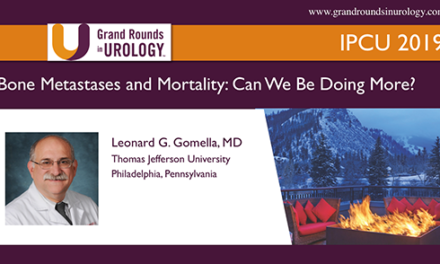Peter J. Rossi, MD, presented “Brachytherapy: What’s New and Where are We Going?” during the 32nd Annual International Prostate Cancer Update (IPCU32) conference on March 8, 2022, in Snowbird, Utah.
How to cite: Rossi, Peter J. “Brachytherapy: What’s New and Where are We Going?” March 8, 2022. Accessed May 2025. https://grandroundsinurology.com/brachytherapy-whats-new-and-where-are-we-going/
Brachytherapy: What’s New and Where are We Going? – Summary
Peter J. Rossi, MD, a board-certified radiation oncologist affiliated with Calaway Young Cancer Center at Valley View Hospital in Glenwood Springs, Colorado discusses innovations and advances in low-dose-rate (LDR) and high-dose-rate (HDR) prostate brachytherapy as well as American Brachytherapy Society (ABS) initiatives and training opportunities. Dr. Rossi explains that brachytherapy utilization has declined in the United States. However, he asserts that patients need options and flexibility and automation, artificial intelligence (AI), and magnetic resonance imaging (MRI) innovations in brachytherapy have made the procedure more precise, easier, and safer. Dr. Rossi lays out the workflow of this more idealized procedure that includes automated MRI simulation and contouring, automated MRI treatment planning, automated quality review, automated and manual ultrasound (US)/MRI fusion and intraoperative optimization, and automated MRI post implant dosimetry. He highlights what he calls a key point, the US/MRI intraoperative optimization which allows the team to see what is there and communicate more effectively; he asserts this yields quality implants. Dr. Rossi then turns to MRI assisted/directed and automated HDR brachytherapy, calling the way most teams today perform HDR (place catheters, accept geometry, then plan) “backwards.” He displays the workflow of a more idealized MRI assisted/directed and automated HDR implant that includes automated MRI simulation and contouring; automated MRI treatment planning and quality assurance; and automated MRI catheter tracking, quality assurance, and plan/toxicity comparison. Dr. Rossi cites data that demonstrate this improves patient outcomes. Dr. Rossi explains that these innovations have resulted in a treatment that is evidence-based, innovative, efficient, cost effective, flexible, yields highly personalized treatment, and is of high value to multidisciplinary teams and to patients. He then shows images of the procedure for focal and salvage patients before turning to the value of training and communicating in the future of brachytherapy. Dr. Rossi explains that there has been a dramatic decline in brachytherapy training in residences (50 percent decrease) and cites a 10 percent survival detriment in cervical cancer care without brachytherapy; to remedy this, he outlines training opportunities, fellowships, mentorships, and other opportunities sponsored by the ABS.
About the 32nd Annual International Prostate Cancer Update (IPCU32):
Presented by Program Chair E. David Crawford, MD, The International Prostate Cancer Update (IPCU), is a multi-day, CME-accredited conference focused on new developments in prostate cancer treatment, diagnosis, and prevention. IPCU 32 featured lectures, interactive discussions, panel roundtables, debates, and case reports. This conference was led by expert physicians and is designed for urologists, medical oncologists, radiation oncologists, and other healthcare professionals involved in the diagnosis and treatment of prostate cancer.
ABOUT THE AUTHOR
Peter J. Rossi, MD, a certified radiation oncologist, is associated with the Calaway - Young Cancer Center at Valley View Hospital in Glenwood Springs, Colorado. Holding a medical degree from Wayne State University School of Medicine, he completed his internship and residency at the Naval Medical Center in San Diego, California, and Wake Forest University in Winston-Salem, North Carolina. Dr. Rossi was formerly an associate professor at Emory University School of Medicine and the medical director of oncology at Winship Cancer Institute at Emory Saint Joseph’s Hospital in Atlanta, Georgia. He brings over 25 years of clinical experience to his practice. His numerous publications highlight his commitment to improving quality of life outcomes and showcase innovative approaches in brachytherapy, radiation therapy, and multidisciplinary care for prostate cancer. Actively contributing to a multidisciplinary team, Dr. Rossi is devoted to delivering exceptional care to cancer patients.




